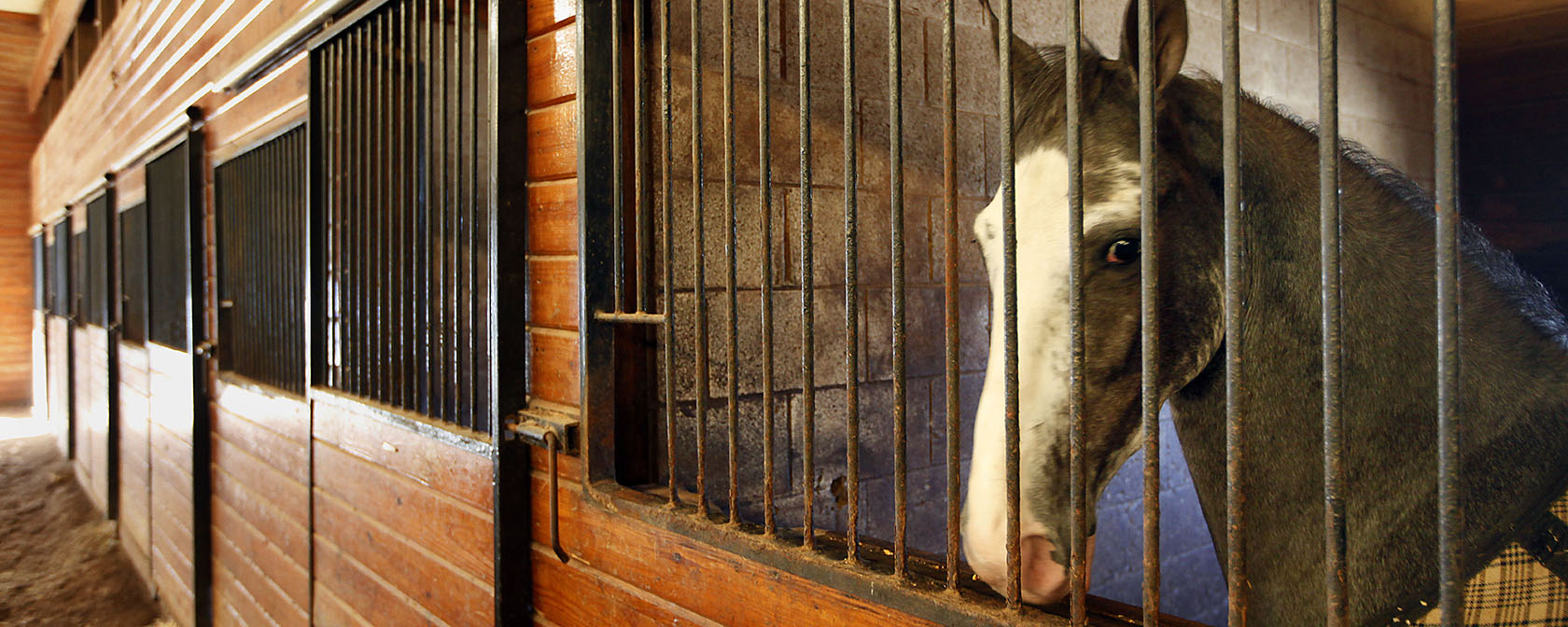By Sara Amundson and Kitty Block
Update March 21, 2024: The Prevent All Soring Tactics (PAST) Act has just been reintroduced in the U.S. Senate as S. 4004 by Sens. Mike Crapo, R-Idaho, and Mark Warner, D-Va., with 48 other original cosponsors—that’s half the Senate! The parallel House bill, H.R. 3090, now has 241 co-sponsors, more than a majority in that chamber. It’s high time to enact the PAST Act and end the indefensible cruelty to horses known as “soring.”
In 1970, the U.S. Congress passed the Horse Protection Act to end the cruel practice of horse soring, which is the use of caustic chemicals, chains, weighted shoes, hard objects, cutting and other painful techniques to force horses to perform the artificial, high-stepping gait known as the "Big Lick" in order to win prizes in horse shows. Despite that law’s passage 53 years ago, the abuse has continued unabated as a scofflaw faction of the Tennessee walking horse industry insists on flouting the law.
Now we have a chance to end it once and for all.
The Prevent All Soring Tactics (PAST) Act, H.R. 3090, has been reintroduced in the House of Representatives with a strong bipartisan set of 185 original co-sponsors led by Reps. Brian Fitzpatrick, R-Pa., Steve Cohen, D-Tenn., Vern Buchanan, R-Fla, and Jan Schakowsky, D-Ill. This critical legislation, which passed in the House in the last two Congresses by a wide bipartisan margin, would help to end soring by strengthening the Horse Protection Act, banning the use of devices that are commonly used to inflict pain on horses, eliminating the failed current system of industry self-policing and increasing penalties for violators.
We are used to fighting the big fights for animals, and sometimes they are also long fights. This is a fight to finally get the basic animal welfare and sporting standards of the 1970 law enforced. In passing the Act, Congress intended to end soring, but the practice remains pervasive in some parts of the Tennessee walking, racking and spotted saddle horse breeds. After over half a century later, the U.S. Department of Agriculture is still finding shocking numbers of horses subjected to soring.
During this time, other national governing bodies of equestrian sport have implemented rules to ensure the welfare of the horses. By contrast, in the Tennessee walking horse universe, the leadership has spent decades blocking reform:
- Over 40 years ago, the Tennessee walking horse breed was ejected from the national horse show regulatory body due to the stigma attached to soring.
- Twenty-three years ago, the U.S. Department of Agriculture reported that 79% of the Big Lick horses that its inspectors examined were found to have pathological abnormalities indicative of soring.
- Seventeen years ago, USDA inspectors disqualified six of 10 horses in the World Grand Championship class at the Tennessee Walking Horse Celebration, causing cancellation of the class.
- Eleven years ago, an HSUS undercover investigation led to the arrest and indictment of a prominent trainer on 52 counts of violating the law—including felony violations of the Horse Protection Act.
- Ten years ago, USDA testing showed that 67% of the horses tested at the Tennessee Walking Horse National Celebration were positive for substances used to hide soring.
- Eight years ago, another HSUS undercover investigation found evidence that the legs of every Big Lick horse in training at the stable were being covered in substances prohibited by the USDA from being used at horse shows.
- Six years ago, the USDA found that 89.5% of horses tested at the Celebration were positive for prohibited foreign substances used to sore the legs of horses (or mask evidence of soring).
- Two years ago, 13 of the 15 members of the Walking Horse Trainers Association board had histories of citations for violating the Horse Protection Act; three were on lengthy federal disqualifications meant to prevent them from participating in horse shows, while the other 10 had previously served disqualifications imposed by the USDA and/or the walking horse industry for alleged violations of the law.
It's hard to imagine such overt corruption playing out in other sports and the leadership remaining intact.
Other than significant increases in Horse Protection Act enforcement funding (and despite strong and broad bipartisan support), to date neither Congress nor the USDA have taken any final, meaningful steps to bring an end to soring.
In 2017, under Secretary Tom Vilsack, the USDA finalized a rule to implement tougher regulations that mirror key elements of the PAST Act. The incoming Trump administration illegally withdrew the rule before its implementation, prompting us to file a lawsuit. The D.C. Circuit Court of Appeals ruled in our favor and remanded the case to the lower D.C. District Court. We still await that Court’s decision on our request that the rule be reinstated.
Meanwhile, with Vilsack again serving as Agriculture Secretary, we are waiting for the USDA’s promised publication of a proposed new rule to fix its weak regulations under the Horse Protection Act. The agency has admitted on numerous occasions that changes are needed to address loopholes that allow the continued suffering of sored horses.
We must act now to protect horses from the cruelty of soring. It's time for Congress to pass the PAST Act and for the USDA to implement the regulatory framework needed to end this horrific practice.
You have the power to speak out for horses: Reach out to your federal legislators now and urge them to co-sponsor if they haven’t yet and help pass this important bill with no weakening amendments, to protect horses from this chronic abuse.
Kitty Block is CEO of the Humane Society of the United States.




